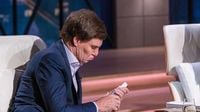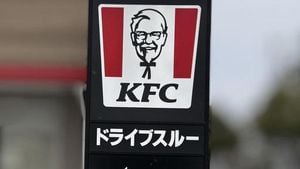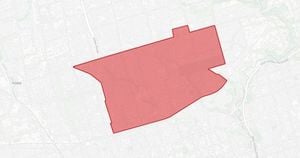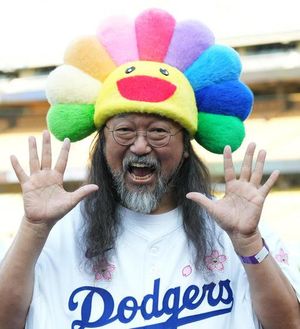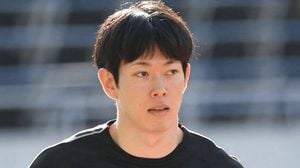In the latest episode of the popular German television show "Die Höhle der Löwen," entrepreneurs Oya Hertfelder and Christian Müller showcased their innovative startup, Max Fitness, which offers a unique solution for users of fascia rollers. The duo aimed to tackle a common issue faced by fitness enthusiasts: the tendency of fascia rollers to slip during exercises. Their product, a patented holder, securely clamps various fascia rollers in place, allowing for a smoother and more effective workout.
Max Fitness's holder utilizes three stainless steel rollers to stabilize the fascia roller within a curved wooden board. This design ensures that the roller remains in a controlled position during use, eliminating the frustration of it rolling away mid-exercise. Additionally, the holder can be mounted on the wall with a device called the "LeanBoard," enabling users to perform standing exercises targeting the back and neck.
The founders presented their concept on the show, supported by ski jumping legend Sven Hannawald, who serves as their brand ambassador. Hannawald, who has experienced back pain himself, enthusiastically endorsed the product, demonstrating its effectiveness to the show's investors.
During their pitch, Hertfelder and Müller requested an investment of 240,000 euros for 20 percent of their company shares to expand their marketing and sales efforts. However, not all investors were convinced. Carsten Maschmeyer, a prominent investor on the show, expressed skepticism about their business model, stating that he believed his expertise lay elsewhere. Similarly, Judith Williams, while impressed by the product, felt she was not the right investor for the venture.
Despite the initial rejections, Ralf Dümmel and Nils Glagau showed interest in the startup. However, a significant hurdle arose when Müller disclosed that they had taken out a loan of 800,000 euros for tools, production, and packaging. Glagau immediately deemed this a dealbreaker, as it affected the valuation of the company.
In a surprising turn, Dümmel remained interested and proposed a new deal: he would offer the requested 240,000 euros, but for a larger stake in the company—30 percent instead of the initially proposed 20 percent. The founders ultimately agreed, securing the investment on live television.
As of April 28, 2025, discussions between Max Fitness and Dümmel's investment firm are ongoing, with a spokesperson confirming that the two parties are still in good communication. "Max Fitness and Ralf Dümmel are still a match," the spokesperson stated, adding that they are exploring the best deal for both sides.
In contrast to the success of Max Fitness, the show also featured another pitch that fell flat. Entrepreneurs Friederike Kogelheide and Benita Botterhuis presented their electronic beauty-tech product, Glim Skin, which aims to revolutionize skincare using cold plasma technology. They requested 300,000 euros for ten percent of their company shares.
However, Maschmeyer was quick to criticize their lack of sales and production, stating, "No revenue, no production, no online shop yet, far too few test subjects, no comparative studies." His harsh assessment reflected a broader skepticism among the investors, particularly regarding the product's high valuation.
Judith Williams echoed these concerns, noting that many similar products on the market yield comparable or better results without the need for such technology. As the entrepreneurs struggled to defend their concept, Maschmeyer bluntly remarked, "You could say that about a toaster too," indicating his disbelief in the uniqueness of their offering.
Despite their efforts to justify their valuation, Kogelheide and Botterhuis faced increasing pressure from the investors. Williams expressed sympathy for the duo, suggesting that their high valuation might have hindered their chances of securing a deal. Ultimately, the two founders left the show without an investment, a stark contrast to the success of Max Fitness.
Another standout pitch came from Joel Enayat, Maximilian Schröpfer, and Niklas Terrahe, who presented their product, pick'em—flavored toothpicks that have gained popularity on social media. They sought 200,000 euros for 15 percent of their company shares and quickly attracted interest from multiple investors.
Dagmar Wöhrl, impressed by the product's appeal, made an offer that matched their request. Dümmel also expressed a desire to invest, while Williams, Maschmeyer, and Tillman Schulz aimed to collaborate on a joint offer for a larger stake. However, the founders hesitated, leading to some frustration among the investors.
Ultimately, the three entrepreneurs settled on a deal of 17.5 percent, marking a successful pitch in a night filled with mixed outcomes.
Additionally, Christoph Graf presented his innovation, the "Little Captain" magic leash, designed to make walking dogs safer for children. He sought 100,000 euros for 25.1 percent of the company shares and successfully struck a deal with Wöhrl, who was eager to invest.
In contrast, Stephanie Lüpold and Gregor Wenter left the show empty-handed after presenting their fermented sauces, re.garum. Despite the flavors impressing some investors, the business model did not resonate enough to secure funding.
As the new season unfolds, it is clear that the competition among entrepreneurs remains fierce, with innovative ideas vying for the attention of investors. The contrasting fortunes of Max Fitness and Glim Skin illustrate the importance of preparation and market readiness in securing investment on "Die Höhle der Löwen."
